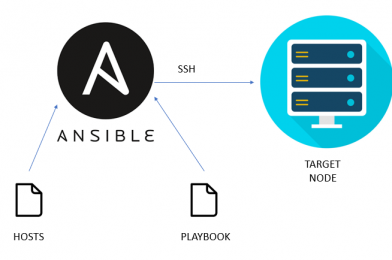With time businesses go digital, the network plays an important role and it becomes the lifeline of the business. Because manually installing and updating configurations for hundreds of switches, firewalls, and routers are really a time-consuming, costly, and error-prone task. IT Automation is required in order to make the process more efficient while eliminating human error.
In the past, automation tools like Chef and Puppet have been widely used, but in the last few years Ansible has emerged as a very compelling tool with many advantages for administrators. If you’re in IT, you must be heard about Ansible. CIO calls it the DevOps “darling” for software automation, in recent times Ansible has come from nowhere to be the No. 1 choice for software automation in many organizations.
What is Ansible?
Ansible is an open-source automation tool, which is used in IT tasks such as application deployment, configuration management, application deployment, intracervical orchestration. In other words, it frees up time and increases efficiency.
Benefits of Ansible
- Free: Ansible is an open-source tool.
- Very simple to set up and use: No special coding skills are necessary to use Ansible’s playbooks.
- Powerful: Ansible lets you model even highly complex IT workflows.
- Flexible: You can orchestrate the entire application environment no matter where it’s deployed. You can also customize it based on your needs.
- Agentless: You don’t need to install any other software or firewall ports on the client systems you want to automate. You also don’t have to set up a separate management structure.
- Efficient: Because you don’t need to install any extra software, there’s more room for application resources on your server.
Why learn Ansible?

Ansible is associate degree open supply configuration management, software system provisioning, and application preparation tool. Its application is found in several Unix-like systems. In addition, it will be organized to figure absolutely with Microsoft Windows moreover. Ansible is gaining huge attention worldwide because the tool provides large and dynamic productivity capabilities like few others.
In 2017, Ansible swollen its user base by over five hundredth. Associate degree integrated Ansible course guarantees a rewarding career to beginners and professionals alike within the increasing world development landscape. The tool provides a strong mechanism to automatize subtle multi-tier IT systems. Hence, it’s gaining traction among technology giants because of a good form of evolving automation challenges.
The rising interest during this field has crystal rectifier to over 72,000 active members of Ansible meetups globally.
Ansible training institute in Hyderabad
Ansible training and certification program by DevOpsSchool is one of the Top Ansible training in Hyderabad, where we offer you both in online and offline classroom mode by top experts/trainers. This Ansible certification training program is designed especially for beginners to help them to understand the advanced level concepts of Ansible such as Ansible Configuration Management. In this Ansible Certification Course you will learn to create your own playbooks and configuring network devices on the platform of Linux or Windows.
Our institute have also multiple Ansible training and Certification venue in top cities like Hyderabad, Bangalore and more. This Ansible Certification Training Course comes up with real world working experience by live project with Ansible. Our support team and experts are always there and ready to clarify all your doubts and questions throughout the training.
After successful completion of Ansible certification training program online, participants will easily crack Red Hat Certified Specialist exam (EX407) and become a Red Hat Certified Specialist.
Conclusion
Nowadays automation is taking a big part of making DevOps done. Manual processes are the enemy. They slow things down, produce space for Kill, and add bloat to come. As a result, demonstrating you’re ready to automatize systems preparation is a vital a part of changing into a DevOps professional. Red Hat’s Ansible may be a common open supply project targeted on automation and configuration management.
Red Hat Certified Specialist in Ansible Automation enables DevOps to show their expertise with Ansible. After getting a strong foundation of skills with knowledge, this certification going to be an excellent addition to your resume and have a good career with this certification with Ansible.
Interested in Ansible training? Try Ansible Certification Training Course by DevOpsSchool.com
I hope you like this particular information about Ansible training in Hyderabad and will help you choose better path ahead.
Thank you!!











